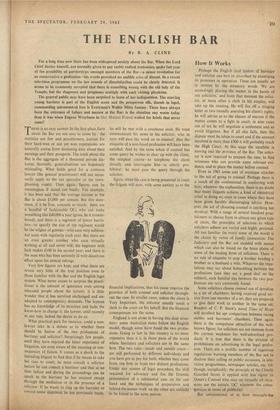THE ENGLISH BAR
By R. A. CLINE
For a long time now there has been widespread anxiety about the Bar. When the Lord Chief Justice himself, not normally given to any rashly radical tendencies, spoke last year of the possibility of partnerships amongst members of the Bar—a minor revolution for so conservative a profession—his words provoked no audible cries of dissent. In a recent television programme on the law sounds of dissatisfaction could be clearly detected. It seems to be commonly accepted that there is something wrong with the old lady of the Temple, but the diagnoses and prognoses multiply with each visiting physician.
The general public may have been surprised to learn of her indisposition. The starving young barrister is part of the English scene and the prosperous silk, thumb in lapel, commanding astronomical fees is Everyman's Walter Mitty fantasy. There have always been the extremes of failure and success at the Bar; is the situation any worse today than it was when Eugene Wrayburn in Our Mutual Friend waited for briefs that never came?
THERE is no easy answer. In the first place, facts about the Bar are not easy to come by : the statistics are few and practitioners, jealous for their hard-won or not yet won reputations, are naturally averse from disclosing data about their earnings and their prospects. The truth about the Bar is the aggregate of a thousand private his- tories. Secondly, generalisations are hopelessly misleading. What holds good for a common lawyer (the general practitioner) will not neces- sarily apply to the tax specialist or the town- planning expert. Then again, figures can be meaningless if stated too baldly. For example, it has been said that the average income at the Bar is about £1,000 per annum. But this state- ment, if it be ¶rue, conceals so much: there are a handful of fashionable QCs who can make something like £40,000 a year (gross, be it remem- bered), and there is a regiment of junior barris- ters—to specify the size of the regiment would be the wildest of guesses—who earn very substan- tial sums with regularity each year. But there are an even greater number who earn virtually nothing at all and never will; the beginner with luck makes £100 in his second year; and there is the man who has been seriously ill with disastrous effect upon his annual takings.
Very few figures are kept, and what there are reveal very little of the true position even to those familiar with the Bar and the English legal system. What never ceases to surprise the practi- tioner is the amount of ignorance even among educated people. about the system; it is little wonder that it has survived unchanged and un- adapted to contemporary demands. The layman has no knowledge of its structure and lacks the know-how to change it; the lawyer, until recently at any rate, lacked the desire to do so.
What practical part, for instance, could a non- lawyer take in a debate as to whether there should be fusion of the two professions of barrister and solicitor? Surprisingly few people, until they have enjoyed the bitter experience of litigation, are even aware of the meaning or con- sequences of fusion. It comes as a shock to the intending litigant to find that if he means to take his case to court, he must consult a solicitor before he can consult a barrister and that at no time before and during the proceedings can he speak to the barrister he has retained except through the mediation or in the presence of a solicitor. If he wants to ring up the barrister to correct sonic statement he has previously made, he will be met with a courteous snub. He must communicate his news to his solicitor, who in turn will pass the word on to counsel; thus the etiquette of a non-fused profession will have been satisfied. And by the same token if counsel has some query he wishes to clear up with the client, the simplest course—to telephone the client directly and. interrogate him—is utterly pro- hibited: he must pass the query through his solicitor.
Again, when his case is being presented in court the litigant will note, with some anxiety as to the financial implications, that his cause requires the presence of both counsel and solicitor through- out the case. In smaller cases, unless the client is Very Important, the solicitor usually sends a clerk to the court on his behalf. But the financial consequences are the same.
England is not alone in having this dual struc- ture: some Australian states follow the English model, though some have fused the two profes- sions. Going to law in this country is no more expensive than it is in those parts of the world where barristers and solicitors are in the same firm. The two roles—inside and outside court— are still performed by different individuals and you have got to pay for both, whether they come from one firm or from two distinct professions. Under any system of legal procedure the skill required for advocacy and for. the forensic presentation of a substantial case on the one hand and the techniques of preparation and behind-the-scenes work on the other are unlikely to be found in the same person.






































 Previous page
Previous page